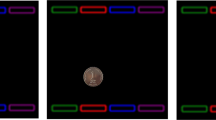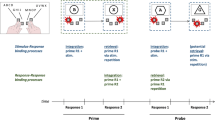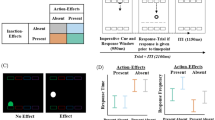Abstract
Voluntary action control is accomplished through anticipating that action’s perceptual outcomes. Some evidence suggests that this is only true when responses are intention-based rather than stimulus-based and that this difference is evidence of different response modes. More recently, however, it has been shown that response-outcome retrieval effects can occur with stimulus-based responses, and that the retrieval depended on response selection efficiency as decreasing the response selection efficiency increased response-outcome retrieval (Gozli et al., J Exp Psychol: Hum Percept Perform, 2016). We look to extend this finding by manipulating response selection difficulty within (Experiment 1) or between blocks (Experiment 2) and response preparation time (Experiment 1) within an experiment. Individuals completed a task in which they responded to onsets using the spatially corresponding finger. The onset was preceded by precues narrowing down the response possibilities from four to two. The response possibilities were either on the same hand or different hands, such that response selection was easy or hard. We also varied the amount of time between the cues and the targets to manipulate response preparation time. The results indicated that trial-by-trial manipulations of response selection difficulty did not influence response-outcome retrieval, but that the between groups manipulation of response preparation time did. With less time response preparation time, larger response-outcome compatibility effects were found. This study presents further evidence that response selection efficiency can influence response-outcome retrieval and that this difference can be accounted for in terms of how prepared the responses are at the time of target presentation.



Similar content being viewed by others
Notes
Similarly, Herwig and Waszak (2012) found trial-by-trial R-O binding effects for both intention- and stimulus-based responses, but found long-term learning effects (R-O compatibility effects in a test phase that followed a learning phase) only when intention-based response selection was used.
Thank you to an anonymous reviewer for suggesting this possibility.
References
Adam, J. J., Hommel, B., & Umiltà, C. (2003). Preparing for perception and action (I): The role of grouping in the response-cuing paradigm. Cognitive Psychology, 46, 302–358. https://doi.org/10.1016/S0010-0285(02)00516-9.
Adam, J. J., Hommel, B., & Umiltà, C. (2005). Preparing for perception and action (II): Automatic and effortful processes in response cueing. Visual Cognition, 12(8), 1444–1473. https://doi.org/10.1080/13506280444000779.
Ansorge, U. (2002). Spatial intention-response compatibility. Acta Psychologica, 109(3), 285–99. Retrieved from http://www.ncbi.nlm.nih.gov/pubmed/11881904.
Cardoso-Leite, P., Mamassian, P., Schütz-Bosbach, S., & Waszak, F. (2010). A new look at sensory attenuation. Action-effect anticipation affects sensitivity, not response bias. Psychological Science, 21(12), 1740–1745. https://doi.org/10.1177/0956797610389187.
Elsner, B., & Hommel, B. (2001). Effect Anticipation and Action Control. Journal of Experimental Psychology: Human Perception and Performance, 27(1), 229–240.
Elsner, B., & Hommel, B. (2004). Contiguity and contingency in action-effect learning. Psychological Research Psychologische Forschung, 68(2–3), 138–154. https://doi.org/10.1007/s00426-003-0151-8.
Francis, G. (2012). Publication bias and the failure of replication in experimental psychology. Psychonomic Bulletin & Review, 19, 975–991.
Frings, C. (2011). On the decay of distractor-response episodes. Experimental Psychology, 58(2), 125–131. https://doi.org/10.1027/1618-3169/a000077.
Gozli, D. G., & Ansorge, U. (2016). Action selection as a guide for visual attention. Visual Cognition, 24(1), 38–50. https://doi.org/10.1080/13506285.2016.1176095.
Gozli, D. G., Goodhew, S. C., Moskowitz, J. B., & Pratt, J. (2013). Ideomotor perception modulates visuospatial cueing. Psychological Research Psychologische Forschung, 77, 528–539. https://doi.org/10.1007/s00426-012-0461-9.
Gozli, D. G., Huffman, G., & Pratt, J. (2016). Acting and Anticipating: Impact of Outcome-Compatible Distractor Depends on Response Selection Efficiency. Journal of Experimental Psychology: Human Perception and Performance.
Greenwald, A. G. (1972). On doing two things at once: Time sharing as a function of ideomotor compatibility. Journal of Experimental Psychology: General, 94(1), 52–57.
Herwig, A., Prinz, W., & Waszak, F. (2007). Two modes of sensorimotor integration in intention-based and stimulus-based actions. Quarterly Journal of Experimental Psychology (2006), 60(11), 1540–1554. https://doi.org/10.1080/17470210601119134.
Herwig, A., & Waszak, F. (2009). Intention and attention in ideomotor learning. Quarterly Journal of Experimental Psychology (2006), 62(2), 219–227. https://doi.org/10.1080/17470210802373290.
Hommel, B. (1994). Spontaneous decay of response-code activation. Psychological Research Psychologische Forschung, 56(4), 261–268. https://doi.org/10.1007/BF00419656.
Hommel, B. (2000). The prepared reflex: Automaticity and control in stimulus-response translation. In S. Monsell & J. Driver (Eds.), Control of cognitive processes: Attention and performance XVIII (pp. 247–273). Cambridge, MA: MIT Press.
Hommel, B. (2005). How much attention does an event file need? Journal of Experimental Psychology. Human Perception and Performance, 31(5), 1067–1082. https://doi.org/10.1037/0096-1523.31.5.1067.
Hommel, B. (2013). Ideomotor action control: On the perceptual grounding of voluntary actions and agents. In W. Prinz, M. Beisert & A. Herwig (Eds.), Action science: Foundations of an emerging disipline (pp. 113–136). Cambridge, MA: MIT Press.
Keizer, A. W., Hommel, B., & Lamme, V. A. F. (2015). Consciousness is not necessary for visual feature binding. Psychonomic Bulletin & Review, 22(2), 453–460. https://doi.org/10.3758/s13423-014-0706-2.
Kingstone, A., & Pratt, J. (1999). Inhibition of return is composed of attentional and oculomotor processes. Perception & Psychophysics, 61(6), 1046–1054.
Klein, R. M. (2000). Inhibition of return. Trends in cognitive sciences, 4(4), 138–147.
Koch, I., & Kunde, W. (2002). Verbal response-effect compatibility. Memory & Cognition, 30(8), 1297–1303.
Krieghoff, V., Waszak, F., Prinz, W., & Brass, M. (2011). Neural and behavioral correlates of intentional actions. Neuropsychologia, 49(5), 767–776. https://doi.org/10.1016/j.neuropsychologia.2011.01.025.
Kühn, S., & Brass, M. (2010). The cognitive representation of intending not to act: Evidence for specific non-action-effect binding. Cognition, 117, 9–16. https://doi.org/10.1016/j.cognition.2010.06.006.
Kühn, S., Keizer, A. W., Rombouts, S. A., & Hommel, B. (2011). The functional and neural mechanism of action preparation: roles of EBA and FFA in voluntary action control. Journal of Cognitive Neuroscience, 23(1), 214–220.
Kunde, W. (2001). Response-effect compatibility in manual choice reaction tasks. Journal of Experimental Psychology: Human Perception and Performance, 27(2), 387.
Kunde, W. (2004). Response priming by supraliminal and subliminal action effects. Psychological Research Psychologische Forschung, 68(2–3), 91–96. https://doi.org/10.1007/s00426-003-0147-4.
Kunde, W., Koch, I., & Hoffmann, J. (2004). Anticipated action effects affect the selection, initiation, and execution of actions. Quarterly Journal of Experimental Psychology, 57A, 87–106.
Le Bars, S., Hsu, Y.-F., & Waszak, F. (2016). The impact of subliminal effect images in voluntary vs. stimulus-driven actions. Cognition, 156, 6–15. https://doi.org/10.1016/j.cognition.2016.07.005.
Memelink, J., & Hommel, B. (2013). Intentional weighting: a basic principle in cognitive control. Psychological Research Psychologische Forschung, 77(3), 249–259. https://doi.org/10.1007/s00426-012-0435-y.
Miller, J. (1982). Discrete versus continuous stage models of human information processing: in search of partial output, 8(2), pp. 273–296.
Obhi, S. S., & Haggard, P. (2004). Internally generated and externally triggered actions are physically distinct and independently controlled., 518–523. https://doi.org/10.1007/s00221-004-1911-4.
Paelecke, M., & Kunde, W. (2006). Action-Effect Codes in and Before the Central Bottleneck: Evidence From the Psychological Refractory Period Paradigm. Journal of Experimental Psychology. Human Perception and Performance, 33, 627–644.
Pfister, R., Heinemann, A., Kiesel, A., Thomaschke, R., & Janczyk, M. (2012). Do endogenous and exogenous action control compete for perception? Journal of Experimental Psychology: Human Perception and Performance, 38(2), 279–284. https://doi.org/10.1037/a0026658.
Pfister, R., & Janczyk, M. (2012). Harleß’ Apparatus of Will: 150 years later. Psychological Research Psychologische Forschung, 76(5), 561–565. https://doi.org/10.1007/s00426-011-0362-3.
Pfister, R., & Janczyk, M. (2013). Confidence intervals for two sample means: Calculation, interpretation, and a few simple rules. Advances in Cognitive Psychology, 9(2), 74–80. https://doi.org/10.2478/v10053-008-0133-x.
Pfister, R., Janczyk, M., Gressmann, M., Fournier, L. R., & Kunde, W. (2014). Good vibrations? Vibrotactile self-stimulation reveals anticipation of body-related action effects in motor control. Experimental Brain Research, 232(3), 847–854. https://doi.org/10.1007/s00221-013-3796-6.
Pfister, R., Kiesel, A., & Hoffmann, J. (2011). Learning at any rate: Action-effect learning for stimulus-based actions. Psychological Research Psychologische Forschung, 75, 61–65. https://doi.org/10.1007/s00426-010-0288-1.
Pfister, R., Kiesel, A., & Melcher, T. (2010). Adaptive control of ideomotor effect anticipations. Acta Psychologica, 135(3), 316–322. https://doi.org/10.1016/j.actpsy.2010.08.006.
Reeve, T. G., & Proctor, R. W. (1984). On the advance preparation of discrete finger responses. Journal of Experimental Psychology. Human Perception and Performance, 10(4), 541–553. Retrieved from http://www.ncbi.nlm.nih.gov/pubmed/6235318.
Shin, Y. K., & Proctor, R. W. (2012). Testing the boundary conditions of the ideomotor hypothesis using a delayed response task. Acta Psychologica, 141, 360–372.
Shin, Y. K., Proctor, R. W., & Capaldi, E. J. (2010). A review of contemporary ideomotor theory. Psychological Bulletin, 136(6), 943–974. https://doi.org/10.1037/a0020541.
Stock, A., & Stock, C. (2004). A short history of ideo-motor action. Psychological research, 68(2–3), 176–188.
Wirth, R., Pfister, R., Brandes, J., & Kunde, W. (2016). Stroking me softly: Body-related effects in effect-based action control. Attention, Perception, & Psychophysics, 78, 1755–1770.
Wolfensteller, U., & Ruge, H. (2011). On the timescale of stimulus-based action-effect learning. Quarterly Journal of Experimental Psychology (2006), 64(February 2015), 1273–1289. https://doi.org/10.1080/17470218.2010.546417.
Ziessler, M., & Nattkemper, D. (2011). The temporal dynamics of effect anticipation in course of action planning. The Quarterly Journal of Experimental Psychology, 64, 1305–1326.
Acknowledgements
This project was supposed by the Natural Sciences and Engineering Research Council of Canada through discovery Grant awarded to Jay Pratt and by a Start-up research grant from University of Macau awarded to Davood G. Gozli. We also thank Heng-Hsuan Chu for her assistance with data collection.
Funding
This project was supported by the Natural Sciences and Engineering Research Council of Canada, in form of a discovery grant to Jay Pratt.
Author information
Authors and Affiliations
Corresponding authors
Ethics declarations
Conflict of interest
The author declares that he has no conflict of interest.
Ethical approval
All procedures performed were in accordance with the ethical standards of the institutional and/or national research committee and with the 1964 Helsinki declaration and its later amendments or comparable ethical standards.
Informed consent
All participants provided informed consent before participating in the study.
Rights and permissions
About this article
Cite this article
Huffman, G., Gozli, D.G., Hommel, B. et al. Response preparation, response selection difficulty, and response-outcome learning. Psychological Research 83, 247–257 (2019). https://doi.org/10.1007/s00426-018-0989-4
Received:
Accepted:
Published:
Issue Date:
DOI: https://doi.org/10.1007/s00426-018-0989-4




